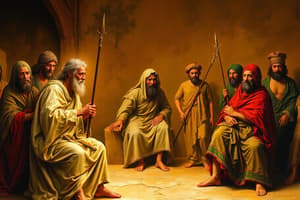Podcast
Questions and Answers
Questions are hidden until you start the quiz
Study Notes
Diving into the Book of Exodus: Themes, Context, and Significance
The Book of Exodus is a foundational text in the Hebrew Bible, recounting the epic journey of the Israelites from their enslavement in Egypt to their arrival at the sacred mountain of Sinai. This captivating narrative weaves together themes of deliverance, identity, freedom, and the covenant between God and humanity.
Themes of Exodus
-
Redemption: The Israelites' escape from Egyptian slavery symbolizes redemption, a central theme throughout the story. God's deliverance of the Israelites is a powerful demonstration of God's ability and willingness to rescue and protect God's people.
-
Identity: Exodus paints a vivid picture of the Israelites' evolving identity, unfolding from a people of slaves to a nation of priests. The construction of the Tabernacle, a sacred space of worship and communion with God, highlights the Israelites' transition from a people with no fixed identity to a unique and holy people.
-
God's Faithfulness: The Book of Exodus emphasizes the consistency and reliability of God's promises and actions. God's provision of the Passover lamb, the parting of the Red Sea, and the sustenance of manna and quail are examples of God's faithfulness to the Israelites.
-
Relationship to God: Exodus outlines the Israelites' ongoing relationship with God, highlighting the importance of living as a holy people and maintaining a sacred space for worship. The Ten Commandments, given to Moses at Sinai, serve as a practical guide for how the Israelites should conduct themselves and live out their relationship with God.
-
Leadership: Exodus illustrates the qualities and responsibilities of leadership, as embodied in figures such as Moses and Aaron. The successful leadership of these figures demonstrates the importance of integrity, wisdom, and faith in God for effective leadership.
-
Worship: The Book of Exodus emphasizes the centrality of worship in the lives of the Israelites. The construction of the Tabernacle and the ensuing rituals of worship provide a blueprint for the manner in which God's people should interact with God.
-
Community: The narrative in Exodus underscores the importance of the Israelites working together as a cohesive community. The Israelites' collective struggle and eventual success highlight the significance of unity and cooperation within the Israelite community.
Historical Context
Exodus is set in the late second millennium BCE during the time of the Egyptian New Kingdom. The Israelites are a marginalized people, dwelling in the land of Goshen, a region within Egypt. Around 1300 BCE, the Pharaoh Ramses II ruled Egypt, and the Israelites were most likely a part of the Hebrew-speaking Semitic population that had settled in the region.
Canonical Context
Exodus is the second book in the Hebrew Bible's Torah, or first five books of the Christian Old Testament. It is preceded by the Book of Genesis and followed by the Book of Leviticus. The Book of Exodus is the foundational text for the covenant established between God and the Israelites at Mount Sinai, setting the stage for the Mosaic Law and the Israelites' subsequent journey towards the Promised Land.
Exodus, along with other texts in the Hebrew Bible and Christian Old Testament, serves as the basis for the Abrahamic faiths—Judaism, Christianity, and Islam—and has influenced the development of Western civilization.
In summary, the Book of Exodus is a rich and captivating narrative that explores themes of redemption, identity, faithfulness, relationship to God, leadership, worship, and community. Its historical context is set in the late second millennium BCE during the time of the Egyptian New Kingdom. Exodus holds a fundamental place in the Hebrew Bible and the Abrahamic faiths, influencing the development of Western civilization.
Studying That Suits You
Use AI to generate personalized quizzes and flashcards to suit your learning preferences.



